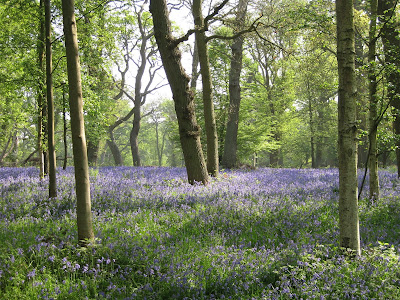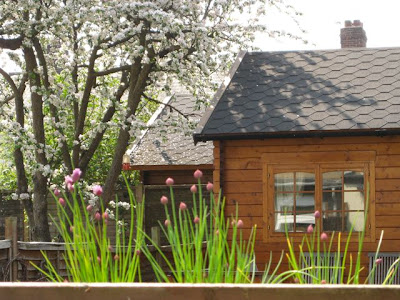With only 3 months to go before we embark on our big trip, there's not a lot of time to make things, which is sad for me! But green things are growing, and that somehow gives me great creative satisfaction. We have a fair few things in at the allotment and our little strip of garden at home is coming along, with things that will be colourful - geraniums, lobelia, pansies, sunflowers, dahlias and lots of tasty herbs, lettuce, peas and tomatoes.
So I've been pondering happiness for a while now. By the time one gets to thirty (in a few months)it is a wonderful thing to be happy. I think I have spent a good 16 or so years of my life being deeply deeply unhappy (most of my teen/adult life). At times I was seriously depressed. Why? I'm still figuring that out. I had everything I needed, materially, more than most of the world in fact, and nothing particularly traumatic happened to me, well - a serious long term illness, a marriage breakup and various other things life throws at you - nothing that other folks don't also go through and cope with. Why do some people seem to basically be happy people, and others, like myself, seem to be basically unhappy? (not unhappy at the moment by the way, feeling pretty chipper)
By happiness, I mean something like contentment, positive well-being, and a general sense that life is good. There is much to say on the topic of depression, which I think is a many headed beast. Clinical depression is an illness rather than a tendency toward sadness,negativity or anxiety, and it has a variety of causes and treatments. Some of it is chemically caused, and is sometimes just as simply treated. A genetic pre-disposition toward depression may mean that a relatively minor trauma or stress will trigger the onset of depression. More often than not it is caused by a combination of traumatic events, ways of thinking, and chemical imbalance or nutritional imbalances. But I am interested here not so much at in looking at depression, but at happiness and what makes some people happier than others - so not just the absence of negative feelings, but the preponderance of positive feelings and general contentment.
There are many many theories and hundreds of books about the matter- here's a selection of musings from a few books that I thought were excellent and which each provided a slightly different take on the subject.
Genetics is one thing, according to Sonjya Lyubomirsky (author of 'The How of Happiness'), scientific studies show that we have a happiness 'set point' that is essentially genetically determined. Out of all the factors influencing happiness 50% is made of up a genetic set-point, to which you inevitably return, despite fluctuations in fortune generating positive or negative events. Slightly demoralising news? Not so- she goes on to say that although 10% of factors affecting happiness are made up of circumstances mostly beyond our control (accidents or illness affecting health, inherited wealth, beauty, etc), the remaining 50% is
within our control : determined by our attitudes, thought processes and actions (what we think and do). Lyubomirsky's book was based on clinical trials and science based evidence, so only covered what has been assessed in various peer-revised trials. Accordingly, the happiest folk tended to:
-Devote time to friends and family (more than average)
-Express gratitude for all they have
-Regularly help others (friends, co workers and passersby)
-Think optimistically about the future
-Savour life's pleasures and live in the present moment as much as possible
-exercise regularly (at least weekly)
-hold deeply committed life goals and ambitions
-Happy people are not exempt from suffering- they just deal with it differently, and have more resources to cope with it and find purpose in it
Biologically it seems that happiness is not necessarily instinctive. Richard O' Connor ('Happiness: the thinking person's guide') argues that three main things make us unhappy. The first is biology. Our brains, it seems, are hardwired into seeking what we want - to win, to acquire, to dominate - good for the survival of the species, but bad, it seems for happiness. The second is our minds, which, use all sorts of defenses to help us survive traumatic or confusing situations. These defense mechanisms, (denial, procrastination, projection, disassociation and so on) have a useful purpose - helping us deal with stress or trauma, but in many situations they become unhelpful distortions of reality that can lead to self-sabotaging behaviour - addictions, escapism, extreme risk aversion and so on. It seems that our thinking patterns generate neural networks, that actually physically change the shapes of our brain (a great book on this is 'The brain that changes itself', by Norman Doidge). The good news is, by cultivating practices of happiness, you can change your mind (literally) so you form neural networks associated with happiness, and constructive thinking rather than self defeating thinking. Finally - society is the third factor causing unhappiness. Oliver James, a British psychologist and author ( 'Alffuenza', and 'Britain on the couch') also cites this as a huge cause of increasing depression and unhappiness in the world. Modern society relies on making us unhappy so that we'll buy more. Impossible beauty ideal, constant upward comparisons and increasingly inequality between rich and poor make us much more aware of what we don't have, and more unrealistically think that we can attain what we don't have. Overwork, constant multitasking, and debt are becoming normal ways of functioning. None of these aid well-being.
A movement called positive psychology, spearheaded by Martin Seligman (Authentic happiness) looks at optimism and pessimism, as basic personal styles of operating and how these impact on happiness. Apparently, people who are basically pessimists, interpret good events as having temporary,and specific causes (it was once off, or they were having a good day). The optimist, on the other hand, will attribute good things to universal, permanent causes (I'm really good at this and they recognised that) You can see whether you are an optimist or pessimist by doing a test on this
website.
According to Seligman you can increase your optimism by recognising, and arguing with automatic negative interpretations of events. He uses ABCDE model -
Adversity (something happens)
Belief (what you say to yourself)
Consequences (of that belief)
Disputation (of your routine belief)
Energization (that happens once you successfully dispute inaccurately negative beliefs).
And whattya know, I find that I'm a pessimist. It is a little disconcerting, owning up to some traits I'd rather not have. I am highly self critical, struggle with low self esteem and insecurity, and get quite worried about people not liking me.
Fortunately, it seems that there are many thing that can be done about these traits, and since this is now rather a long post, more on that next time...

Till then, here's a nice staircase at Kew Gardens. Positive upward spirals, anyone?







































